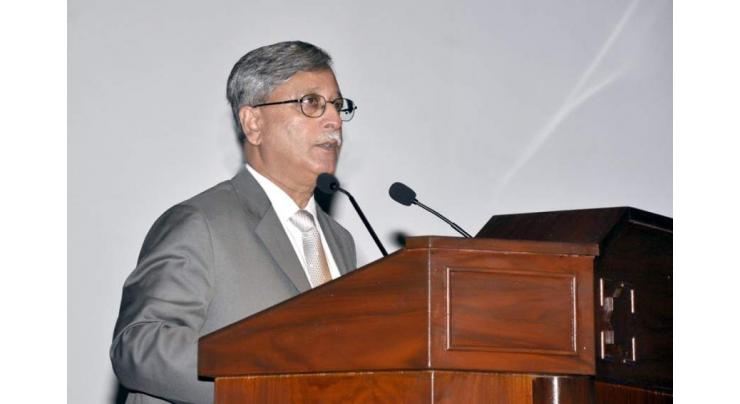
Pakistan Won't Allow Any Disturbance Of Strategic Balance: NCA Adviser
Fahad Shabbir (@FahadShabbir) Published November 06, 2018 | 10:29 PM

Pakistan would not allow the strategic imbalance with India as strategic balance guarantees peace in the region.
ISLAMABAD, (UrduPoint / Pakistan Point News - 6th Nov, 2018 ) :Pakistan would not allow the strategic imbalance with India as strategic balance guarantees peace in the region.
This was stated by Adviser to the National Command Authority Lt Gen (r) Khalid Kidwai here Tuesday while inaugurating a two-day international conference on 'Nuclear Deterrence and Strategic Stability in South Asia'. The conference has been organized by Strategic Vision Institute (SVI), an Islamabad based think tank.
Kidwai said, the history of our strategic force development clearly indicates that Pakistan has never allowed this (strategic) balance to be disturbed to our disadvantage; we have always found effective solutions to redress induced imbalances from time to time. "Pakistan remains unfazed and as before, we have adequate response options which will disallow any disturbance of the strategic balance or strategic stability. That fundamental policy will prevail," he underscored.
The strategic environment in South Asia, he said, is becoming increasingly complex and unpredictable in the long term as India adopts provocative military doctrines like cold start doctrine and undertakes destabilizing actions like nuclearization of Indian Ocean and the acquisition and development of ballistic missile defense. India has been doing this out of its ambitions of regional hegemony and achieving the great power status. "In the future too you can be certain that Pakistan will never allow the effectiveness of its nuclear deterrence to be eroded notwithstanding efforts to undermine it, the latest example being the Indo-Russian deal to induct five systems of the S400 in the Indian Air Force by 2020 with implications for strategic stability," Kidwai said.
He maintained that Pakistan's response to India's nuclear-capable ballistic missile submarine INS Arihant could be found in Full Spectrum Deterrence. Elaborating the features of Full Spectrum Deterrence, he said, it implied possession of a full array of strategic, tactical and operational weapons, having appropriate weapons yield, coverage and numbers, and liberty to choose targets.
As a result of persistent and aggressive attempts at destabilizing the strategic balance by India, he maintained that Pakistan felt confident and capable of transiting to the policy of full spectrum deterrence.
The NCA Adviser also spoke about the "big power competition" and "unresolved conflicts" and the quest for regional hegemony. He opined that these would have consequences for strategic stability.
"In a sense one may therefore surmise that the responsibility of ensuring strategic stability in South Asia invariably falls on Pakistan and I can assure you that we will continue to shoulder that responsibility - with responsibility and restraint so as to ensure that imbalances and strategic instability injected into an otherwise balanced nuclear deterrence equation does not become for the other side an incentive for adventure," he said.
SVI President Dr Zafar Iqbal Cheema, on this occasion, said India was looking for space for fighting a limited war with Pakistan, whereas the latter was trying the deprive the former of that opportunity by coming up with responses like tactical deterrence. "This is our contribution to peace," he added.
India, he regretted, was pushing the region into an arms race that would have long lasting consequences.
The conference, which is being addressed by a number of international as well as local experts, is seeking to examine the impact of doctrinal shifts, the capabilities possessed by the nuclear weapon states in the region, the induction of new technologies by the concerned countries, and role of extra-regional powers on the strategic stability in South Asia. The think tank believes that equilibrium of nuclear deterrence between India and Pakistan is the underpinning of the South Asian strategic stability.
Recent Stories

Govt likely to hike electricity price once again

Bismah Maroof announces immediate retirement from international cricket

Malala expresses unwavering support for Gaza people

Selection committee dissolved over Pakistan women cricket team's poor performanc ..

Punjab CM Maryam Nawaz in police uniform at Chung police center

Currency Rate In Pakistan - Dollar, Euro, Pound, Riyal Rates On 25 April 2024

Today Gold Rate in Pakistan 25 April 2024

Mired in crisis, Boeing reports another loss

Session Awarding Ceremony 2024 held at Cadet College Muzaffarabad

Austrian ski great Hirscher to make comeback under Dutch flag

Pakistan, Japan agrees to convene 'Economic Policy Dialogue'

FM Dar conveys deepest sympathy on torrential rains devastation in UAE
More Stories From Pakistan
-
Four persons injured in car rollover accident
4 minutes ago -
Provincial Ombudsman Secretariat is determined to address public complaints
14 minutes ago -
277 training sessions held for livestock farmers
24 minutes ago -
24 criminals held
24 minutes ago -
Ombudsman’s Dera office dispose of 207 complaints at South Waziristan
34 minutes ago -
Various food points fined over violations:
34 minutes ago
-
PM for political commitment, adequate investment to achive goal of malaria-free world
54 minutes ago -

Malala expresses unwavering support for Gaza people
1 hour ago -
President stresses joint efforts to control Malaria
1 hour ago -
Karachi Police arrest four suspects in crackdown on street crime
1 hour ago -
IRSA releases 163,300 cusecs water
1 hour ago -
Global tributes to kashmiri icon Amanullah Khan on 8th death anniversary
1 hour ago
